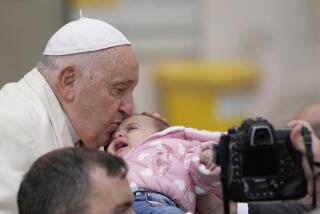Not quite a mea culpa
POPE BENEDICT XVI has apparently, sort of, admitted the truth about the forced religious conversions of the native peoples of the New World. On Wednesday, he acknowledged that “unjustifiable crimes” were committed during colonial-era evangelization in the New World. But he did not repudiate the statements he made on this subject during his visit to South America earlier this month, as was demanded by indigenous groups and by Venezuelan President Hugo Chavez. Chavez even accused the pope of ignoring the “holocaust” that followed Columbus’ “discovery” of the New World in 1492.
On May 13, while speaking to Latin American and Caribbean bishops, the pope demonstrated an amazing ignorance of the history of the violent cultural and religious oppression of indigenous peoples in the New World by European Christians. Benedict stated that the native people had been “silently longing” for Christ and were seeking God “without realizing it.” He said that their conversion was not a conquest but an “adoption” that made “their cultures fruitful, purifying them.... “
Benedict further demonstrated his misunderstanding of the “civilization” and massacres of natives in North, Central and South America when he stated that the church had not imposed itself on indigenous peoples, that Christianity had not been detrimental to their way of life.
“In effect,” he said, “the proclamation of Jesus and of his Gospel did not at any point involve an alienation of the pre-Columbus cultures, nor was it the imposition of a foreign culture.”
Not surprisingly, Benedict’s comments angered Indian leaders in Brazil and elsewhere. Brazilian Indians and native organizations called the pope’s comments “arrogant and disrespectful” and “offensive and, frankly, frightening.” A spokesman for one group said the pope was trying to erase the “dirty work” of colonization, and a spokesman for the Brazilian Indian Missionary Council stated that the pope’s comments demonstrated his Eurocentrism and that he must have “missed some history classes.”
The pope also missed the history of his church and the papal decrees from the 15th century that handed the world over for conquest, conversion and domination by European Christians.
For example, a papal decree in 1455 authorized Portugal “to invade, search out, capture, vanquish and subdue all Saracens and pagans” along the west coast of Africa and to place them into slavery and to take their property.
Then in 1493, after Columbus’ voyage to the New World, Pope Alexander VI issued three decrees. The first granted Spain title to the lands that Columbus had found because they had been “undiscovered by others,” thus ignoring the known presence of indigenous people. The second granted Spain any lands it might come upon in the future provided that they were “not previously possessed by any Christian owner.” And, even more audaciously, the third decree “Inter caetera II” divided the world from the North to the South Pole and granted Spain title to all lands to be discovered west of the line to assist in “the expansion of the Christian rule.”
These were the facts that Benedict overlooked in making his comments in early May. In sharp contrast to those remarks, his predecessor, Pope John Paul II, noted in 1992 that mistakes were made in the conversion of the native peoples of the Americas.
For nearly two weeks, the Vatican was silent in the face of protests against Benedict’s comments. Then on Wednesday, the pope finally acknowledged the violence committed during the colonization of the Americas.
“It is not possible, indeed, to forget the sufferings ... inflicted by colonizers on the indigenous populations, whose fundamental human rights were often trampled on,” he told pilgrims at his weekly audience.
But he by no means apologized for his earlier statements: “While we do not overlook the various injustices and sufferings which accompanied colonization, the Gospel has expressed and continues to express the identity of the peoples in this region.”
This situation is nearly identical to the pontiff’s comments that outraged Muslims last year when he seemed to depict Islam as a religion tainted with violence. He later apologized for the pain his comments caused but apparently did not apologize for the comments themselves.
Clearly, this pope has a long way to go in understanding the truth of the colonization and the history of forced religious conversion of the Americas.
More to Read
Sign up for Essential California
The most important California stories and recommendations in your inbox every morning.
You may occasionally receive promotional content from the Los Angeles Times.










